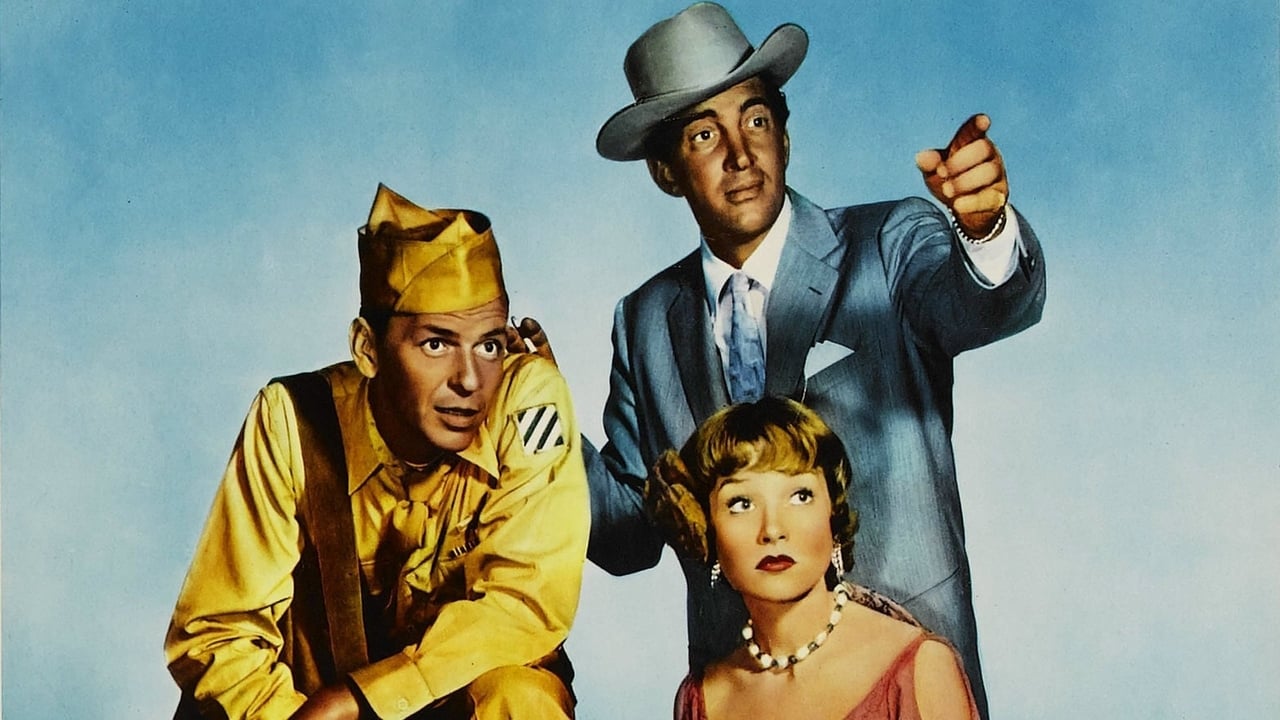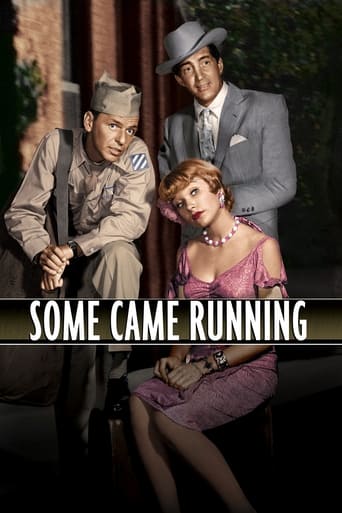

This is a good drama set in the small town of Parkman, Indiana, in 1946 after the war. Frank Sinatra stars in this movie version of James Jones's second novel, as he had in Jones's first novel, From Here to Eternity (1953).This story depicts a post-war "Coming Home" type of story about a soldier trying adjust to a small gossipy town, where he was never really wanted in the first place--at least by his brother (Arthur Kennedy) and his family who view him as the black sheep of the family.On the one hand, Sinatra's character is viewed as an aspiring and gifted writer that is appreciated by a local school teacher (Martha Hyer) and her wealthy professorial father (Larry Gates). On the other hand, he is viewed by the local newspaper and town gossip, as a no-good drifting drinker and gambler who hangs around cheap bars with his floozy pickup girl (Shirley MacLaine) and his locally acquired gambling partner (Dean Martin). Torn between these two worlds threatens to tear him apart.
... View MoreSo-so. Is fairly interesting at the start, as the scene-setting is intriguing. However, it doesn't ever seem to get beyond scene-setting, and after a while just drags and doesn't seem to go anywhere.Frank Sinatra is disappointing in the lead role. He overdoes the alpha male stuff, and just doesn't seem convincing. Pick of the performances has to go to Shirley MacLaine, who is sweet and delightful as Ginny Moorhead. MacLaine well deserved her Best Leading Actress Oscar nomination. Good support from from Arthur Kennedy, Martha Hyer and Dean Martin.
... View MoreAccompanied by Shirley MacLaine, a hooker he picked up in Chicago, Sinatra, a self-described failed writer, is discharged from the US Army and wakes up, hung over, in his home town of Parkman, Indiana. It's the first time he's been home in eighteen years. It's supposed to be 1948, although you'd never know it. Thereafter, intrigues and jealousies and conflicts come and go, evoking memories of soap operas, only told from the man's point of view instead of Craig's other wife's.There are no bands to welcome Sinatra. His older brother, Arthur Kennedy, is a pompous loudmouth who owns a jewelry shop. The script renders Kennedy as a hypocrite but doesn't deprive him of some human qualities. He loves his teen-aged daughter, is treated indifferently by his wealthy wife, and suffers a lapse in his morality when, stricken by an understandable loneliness, he makes it with his attractive secretary, Nancy Gates.Sinatra has given up writing, almost, but take up with the town's intellectuals, including Martha Hyer as a professor of creative writing, who finds his work admirable and sells one of his stories to The Atlantic magazine. (Short story writing; an art now as dead as Medieval glass blowing.) Hyer is an actress whose appeal has always eluded me. She's attractive enough but her performances always sound as if she's demonstrating her skill in a beauty contest. Her character here is cultured and unnatural. She's physically attracted to Sinatra. Of course. He's Chairman of the Board. But the ex-soldier's emotions are to powerful for her and she rejects him and his lower-class friends.Sinatra's friends include the gambler, Dean Martin, who is able to drink three times as much as Old Blue Eyes and the next morning, when Sinatra looks a thorough wreck, manages to be spic and span and on top of his game -- at least until he discovers he has Type 2 diabetes, which he shrugs off.Shirley MacLaine is an agreeable actress. She's pretty, despite the make-up overload and wretched wardrobe, and forthright in her artless candor. She'd do anything for Frank because she loves him beyond imagining. In the end, that's what's required of her.I know it was directed by Vincent Minelli but it's hard to tell. Everything about the movie is more or less routine. It's not one of Elmer Bernstein's better scores -- superabundant and lurid. Colorful characters in everyday settings doing things that aren't especially interesting.
... View MoreSome Came Running is sometimes referenced as the first Rat Pack movie. However, although it is literally the first time a bunch of Rat Pack members ever starred together, this is a far cry from the series of easygoing comedies that would later be made to capitalise on the group's reputation. Some Came Running is instead a brooding and occasionally poignant dramatic thriller.The director is Vincente Minnelli, a man who is better-known for his lavish musicals, and one often lauded (or dismissed) as a dreamer and a lover of beauty. Some Came Running however proves his abilities with serious and convoluted story lines. What is fascinating here is the way Minnelli uses his elaborate visual style to bring clarity to the picture's web of subplots. No-one really used the widescreen format quite like him, and no-one really has since. It's amazing that he can use so few close-ups, and put so much detail into a shot, and yet still make us focus totally on what is important. A good example is the scene where Arthur Kennedy hears about his brother's return over the phone. Kennedy's secretary enters the room and comes into the foreground. The young men in the background of the shot of the man on the other end of the phone even encourage our eyes to that side of the screen. Secretaries are usually functional but forgettable bit parts, but her placement in this scene makes us remember her even though she doesn't speak, and this pays off when she later has an important part to play in the story. Minnelli doesn't force us to pay too much attention to minutiae of dialogue, but every scene seems arranged to convey some important plot detail like an key character introduction or someone's reaction to a situation, and the distinctive look to each shot helps to seal these ideas in our heads.This picture also happens to be blessed with a perfect cast, whose members shine through their sheer credibility. Take Frank Sinatra and Arthur Kennedy. Neither of them gets any big "powerhouse" scenes, but their performances are captivating because one could really believe they are a pair of chalk-and-cheese brothers, and they subtly bring all the past resentments of their characters to the screen. The real standout though is Shirley MacLaine. She really understands her character's lack of sophistication and goes all out to show it off, but without ever becoming so over-the-top you don't believe it. More importantly she does it in such a way as to elicit sympathy from the audience rather than scorn. And really it is this strand to her story which gives the picture its strongest emotional edge.There were quite a few pictures about small-town morality (or lack thereof) floating about Hollywood around this time, Peyton Place being another prominent example, and in many ways they can be seen a more highbrow counterpoint to Film Noir. Some Came Running is probably the best, and certainly seems the most insightful and the most affecting. To my mind this quality comes mainly from the believability and strength with which its characters are drawn, as they take their places in this overwhelmingly human tragedy.
... View More